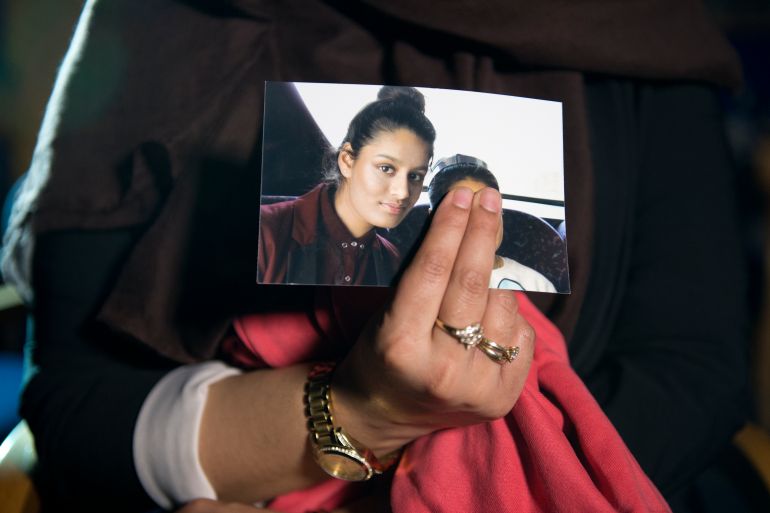Q&A: UN expert on Australia citizenship-stripping plan and ‘legal fiction’
Al Jazeera spoke to UN expert Ben Saul about politicians’ powers to revoke citizenship in light of a recent Australian court ruling.

The Australian Senate is currently considering legislation that would allow government ministers to ask judges to consider removing a person’s citizenship as punishment in certain cases of “serious crimes”.
Australia’s centre-left Labor government introduced the proposed legislation this week after Australia’s High Court recently ruled that previous legislation giving the Minister for Home Affairs the power to revoke citizenship was invalid.
Keep reading
list of 3 itemsHow and why did Shamima Begum lose her UK citizenship?How and why did Shamima Begum lose her ...
Why did Nicaragua strip hundreds of people’s citizenships?Why did Nicaragua strip hundreds of ...
But politicians in Australia are far from the only political leaders who are interested in deciding who should have their citizenship taken away.
In Israel, two different ministers have recently called for football players to lose their citizenship, in one case because a player represented Palestine in World Cup qualifiers, and in another case, because players did not hold up a sign when asked.
In the United Kingdom, then-Home Secretary Sajid Javid revoked Shamima Begum’s citizenship in 2019 for travelling to Syria to join ISIL [ISIS]. Begum has since failed to overturn this decision in multiple appeals.
To better understand the legal and human rights implications of politicians choosing who loses their citizenship, Al Jazeera spoke to Ben Saul, UN Special Rapporteur on the promotion and protection of human rights and fundamental freedoms while countering terrorism.
Al Jazeera: What have recent court decisions meant for citizenship-stripping laws in Australia?
Ben Saul: In Australia, the citizenship laws of the previous government relied on a kind of legal fiction that if you committed certain kinds of terrorism that automatically meant that your citizenship lapsed because it was showing disloyalty and lack of allegiance.
The courts threw that out a while ago because they said, really an administrative decision has to be made to deprive somebody of citizenship. It can’t just operate somehow automatically when the affected person won’t even necessarily know that they’ve lost their citizenship.
The second thing the Australian courts and the High Court, in a series of decisions, have said is that the High Court regards stripping citizenship as a criminal-type penalty or punishment. And, under the Australian Constitution, that’s a power which can only be exercised by a court.
So, essentially what the courts have said is that the minister can’t take that decision. Because of the very serious consequences of stripping citizenship, it’s equivalent to a punishment. Therefore, under Australia’s constitution, at least, only a court can impose that kind of further penalty beyond a criminal conviction.
AJ: How do the Australian court rulings relate to the United Kingdom and, for example, the case of Shamima Begum?
Saul: The Australian approach is a highly protective one. So, it does restrict the way in which you can strip citizenship.
In other countries, it’s a decision that can be made by a minister but which is then reviewable by a court. Or it’s something where the minister applies to a court, for the court to make a decision, but it’s not necessarily a criminal proceeding, it can be a civil proceeding.
So there are a variety of ways of doing it. What’s critical is that the hearing and the process have to be fair.
So, security evidence against them has to be properly disclosed so that they can effectively challenge whatever allegations the government is making.
And secondly, it has to be reviewed by a court so there has to be some form of judicial protection in that process.
The Australian approach goes one step further and says there has to be the protection of a criminal court decision which is a much more robust way of ensuring there are safeguards in place.***

AJ: In Israel, there have been proposals to further expand citizenship-stripping powers. Could the proposed legislation have human rights implications?
Saul: Some years ago, Israel introduced citizenship-stripping laws in terrorism cases, but [recent proposed legislation took this] a step further, expanding those laws.
One of the key concerns is that the legislation would allow somebody to be made stateless, which is contrary to international law.
One of the key restrictions on denationalising people is that you can only do it if somebody has a second nationality, and that nationality is available and effective.
What Israel is proposing to do is that you’d lose Israeli citizenship, you’d be potentially deported to, let’s say the West Bank, but you don’t have any other kind of citizenship or nationality. That’s clearly illegal under international law.
I remind @Israel that any expansion of powers to strip citizenship in relation to terrorism must meet the international law requirements of legality, due process, and judicial protection, and must not make any person statelesshttps://t.co/KXQoG2HNhg @IsraelMFA
— Prof Ben Saul – UN SR Human Rights & Counterterror (@profbensaul) November 6, 2023
AJ: Is it possible for citizenship stripping to be done in a way that follows due process?
Saul: Lack of due process has been absolutely a key concern in many countries.
Sometimes there have been efforts to strip citizenship by ministers, or at the executive governmental level, rather than by a decision of a court applying a full and fair hearing, allowing the evidence to be tested and getting an independent decision maker in a court to make the decision.
If a minister – who is ultimately a politician who is part of the government – is making the decision, that is much more susceptible to political considerations and not necessarily the best way of applying a legal standard.
AJ: Was revoking citizenship a common form of punishment historically?
Saul: Citizenship stripping is historically pretty rare in laws in most countries.
Where it is generally acceptable is if citizenship has been acquired by fraud by somebody. So you’re a foreign national, you come to live in another country, you get citizenship but you’ve done it on false pretences or falsified documents.
The other historical kind of category was cases of treason or treachery, where your country is at war with another country and you do something to assist the enemy, which shows a kind of disloyalty to your own country and those are cases in wartime which have sometimes led to a loss of nationality as well.
AJ: Is that the case with governments that are charging people with terrorism?
Saul: The difference there is that most of the time citizenship in terrorism cases is being stripped where people have committed terrorism against some foreign government or people in a foreign country. So it’s not actually directed towards Australia, to use the example of Australia, and therefore it’s not like there is any disloyalty to Australia as such or enunciation of your allegiance to Australia.
AJ: In some ways is charging people with disloyalty or treason something that seems a little bit old-fashioned?
Saul: That’s right, and a more modern view is if people have citizenship here and have lived here and have connections here and so on, then it’s the responsibility of our country to deal with the terrorist threat that they may pose.
So that could be through criminal prosecution here and putting people in jail if they’ve done something wrong and there are other counterterrorism laws to address any other security threats that they may face.
***[Note: Al Jazeera spoke to Ben Saul before the legislation currently being considered in Australia’s Senate was proposed this week. This new legislation would give ministers the ability to recommend to judges that they consider citizenship stripping as a punishment in certain court cases.]
This interview has been edited for length and clarity.